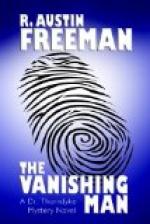“Let us hope it won’t,” I said, but with little conviction, I fear, in my tone. It was harrowing to see her torn by anxiety for her father, and I yearned to comfort her. But what was there to say? Mr. Bellingham was breaking up visibly under the stress of the terrible menace that hung over his daughter, and no words of mine could make the fact less manifest.
We walked silently up the court. The lady at the window greeted us with a smiling salutation, Mr. Finneymore removed his pipe and raised his cap, receiving a gracious bow from Ruth in return, and then we passed through the covered way into Fetter Lane, where my companion paused and looked about her.
“What are you looking for?” I asked.
“The detective,” she answered quietly. “It would be a pity if the poor man should miss me after waiting so long. However, I don’t see him”; and she turned away towards Fleet Street. It was an unpleasant surprise to me that her sharp eyes had detected the secret spy upon her movements; and the dry, sardonic tone of her remark pained me, too, recalling, as it did, the frigid self-possession that had so repelled me in the early days of our acquaintance. And yet I could not but admire the cool unconcern with which she faced her horrible peril.
“Tell me a little more about this conference,” she said, as we walked down Fetter Lane. “Your note was rather more concise than lucid; but I suppose you wrote it in a hurry.”
“Yes, I did. And I can’t give you any details now. All I know is that Doctor Norbury has had a letter from a friend of his in Berlin, an Egyptologist, as I understand, named Lederbogen, who refers to an English acquaintance of his and Norbury’s whom he saw in Vienna about a year ago. He cannot remember the Englishman’s name, but from some of the circumstances Norbury seems to think that he is referring to your Uncle John. Of course, if this should turn out to be really the case, it would set everything straight; so Thorndyke was anxious that you and your father should meet Norbury and talk it over.”
“I see,” said Ruth. Her tone was thoughtful but by no means enthusiastic.
“You don’t seem to attach much importance to the matter,” I remarked.
“No. It doesn’t seem to fit the circumstances. What is the use of suggesting that poor Uncle John is alive—and behaving like an imbecile, which he certainly was not—when his dead body has actually been found?”
“But,” I suggested lamely, “there may be some mistake. It may not be his body after all.”
“And the ring?” she asked, with a bitter smile.
“That may be just a coincidence. It was a copy of a well-known form of antique ring. Other people may have had copies made as well as your uncle. Besides,” I added, with more conviction, “we haven’t seen the ring. It may not be his at all.”




